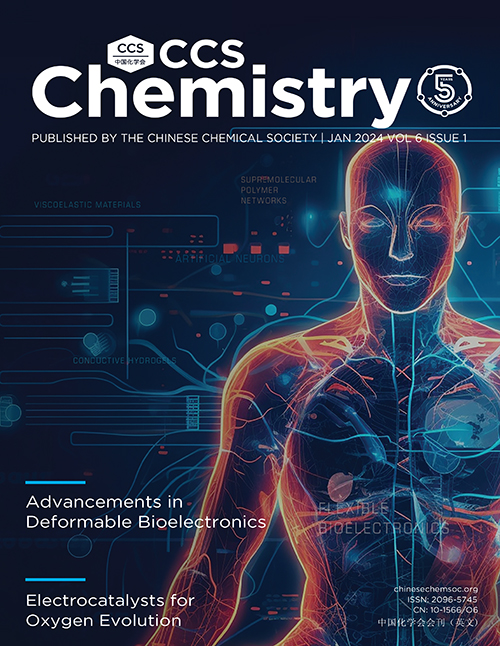Steric control over inter-ligand dihedrals and splay leads to the formation of FeII6L6 and FeII8L8 antiprisms
IF 9.4
1区 化学
Q1 CHEMISTRY, MULTIDISCIPLINARY
引用次数: 0
Abstract
Macrocycles have found uses in guest capture, sensing and porous materials, motivating the development of new methods for their synthesis. Here we report the construction of two types of barrel-shaped macrocyclic assemblies, with trigonal antiprismatic FeII6L6 and square antiprismatic FeII8L8 architectures, from FeII and boron-containing tritopic ligands. Two factors, the steric hindrance of ligands and the preferred coordination angles at different vertices, were observed to regulate the dihedral angles between adjacent ligands, leading to the formation of the structures observed. The effects of ligand steric hindrance led to the formation of a FeII6L6 trigonal antiprism, which efficiently encapsulated persistent environmental pollutant perfluorosulfonate anions. In contrast with the iminopyridine chelating groups of the FeII6L6 structure, the incorporation of azopyridine moieties coordinated to the FeII centres not only increased the vertex opening angle, resulting in the construction of a FeII8L8 square antiprism, but also enabled the redox-driven reversible disassembly of this structure. The design strategies that have enabled the construction of these antiprismatic macrocycles may provide insight into the design principles governing the formation of more complex functional assemblies.
- Download figure
- Download PowerPoint
配体间二面性和展宽的立体控制导致了 FeII6L6 和 FeII8L8 反三棱镜的形成
大环已被用于客体捕获、传感和多孔材料,这促使我们开发新的合成方法。在此,我们报告了由 FeII 和含硼三位配体构建的两类桶状大环集合体,即三棱反三棱 FeII6L6 和方形反三棱 FeII8L8 结构。据观察,配体的立体阻碍和不同顶点的优先配位角这两个因素调节了相邻配体之间的二面角,从而形成了所观察到的结构。配体立体阻碍的影响导致形成了 FeII6L6 三方反棱柱,有效地包裹了持久性环境污染物全氟磺酸阴离子。与 FeII6L6 结构中的亚氨基吡啶螯合基团不同,加入与 FeII 中心配位的偶氮吡啶分子不仅能增大顶点开角,从而构建出 FeII8L8 方形反三棱镜,还能使该结构在氧化还原作用的驱动下可逆分解。能够构建这些反三棱镜大环的设计策略可以让我们深入了解形成更复杂功能组合体的设计原理。 下载图表下载 PowerPoint
本文章由计算机程序翻译,如有差异,请以英文原文为准。
求助全文
约1分钟内获得全文
求助全文
来源期刊

CCS Chemistry
Chemistry-General Chemistry
CiteScore
13.60
自引率
13.40%
发文量
475
审稿时长
10 weeks
期刊介绍:
CCS Chemistry, the flagship publication of the Chinese Chemical Society, stands as a leading international chemistry journal based in China. With a commitment to global outreach in both contributions and readership, the journal operates on a fully Open Access model, eliminating subscription fees for contributing authors. Issued monthly, all articles are published online promptly upon reaching final publishable form. Additionally, authors have the option to expedite the posting process through Immediate Online Accepted Article posting, making a PDF of their accepted article available online upon journal acceptance.
 求助内容:
求助内容: 应助结果提醒方式:
应助结果提醒方式:


